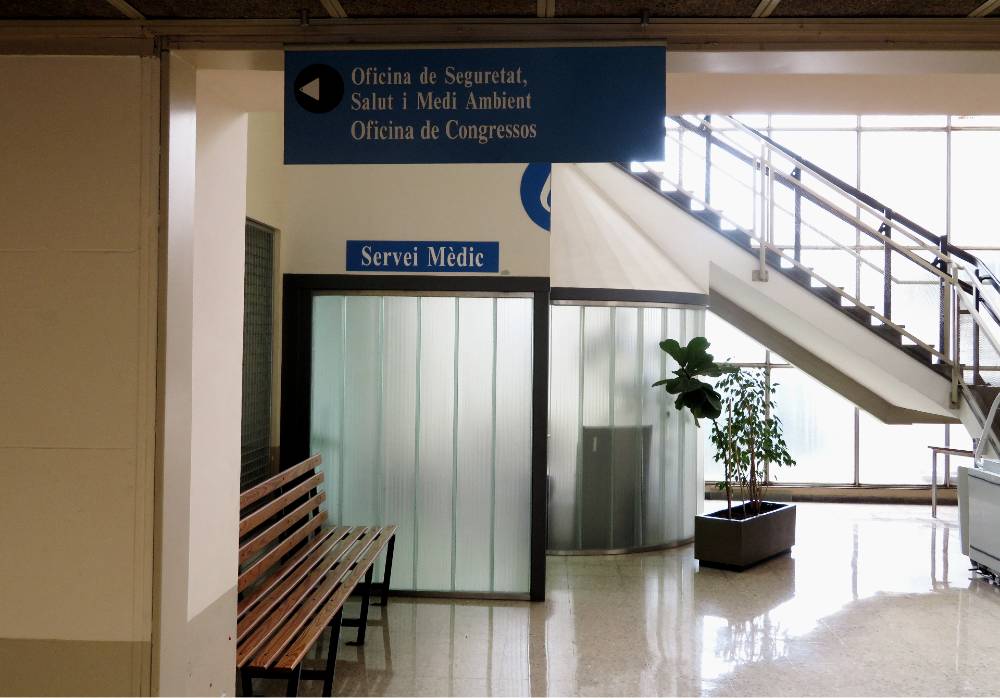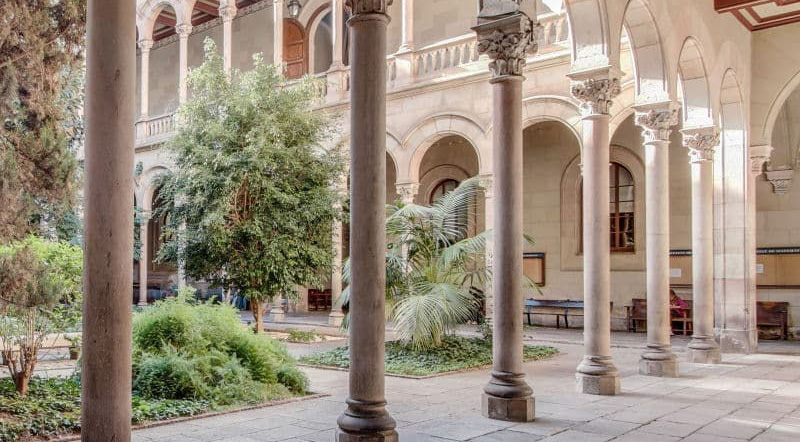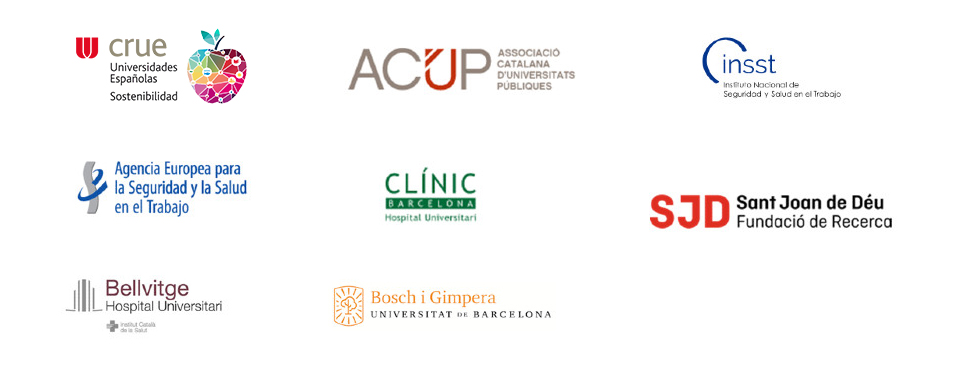The beginnings
The entry into force of Law 31/1995, of November 8, on the prevention of occupational risks meant a new approach to the management of occupational health and safety in all private and public organizations.
The Office of Safety, Health and Environment (OSSMA) was created by agreement of the Board of Governors on May 16, 1998, and began its journey on June 5, 1998, with the aim of providing the University of Barcelona with a technical organizational structure that would provide advice and support in preventive matters, and thus promote a true culture of prevention within the university community.
The OSSMA began its activity under the rectorship of Dr. Antoni Caparrós, with the impulse of the then Vice Rector for Research, Dr. Màrius Rubiralta, and the appointment of Dr. Miquel Seco as the Rector’s delegate for safety, health and the environment. Mr. Josep Baró directed the OSSMA for the first two years. Subsequently, and for twenty years, Mr. Pedro Moreno will continue the task of directing and planning the Office’s activities. Under his leadership, a multidisciplinary team of people trained and experienced in different areas of expertise (health, technical, scientific and social) works to carry out all the necessary actions and all those required by the regulations. Scholarship holders, trainees and external collaborators also participate in these actions on a temporary basis.

Years before the enactment of Law 31/1995, on the prevention of occupational hazards, and the creation of the OSSMA, the University of Barcelona had already set up a body for the prevention of occupational hazards., the Safety and Hygiene Commission, that managed the preventive activity. This commission, in which representatives of various units, divisions and other transversal areas participated, worked for the safety and health of University staff following the rules established by the General Ordinance for Safety and Hygiene at Work . Years later, as a result of these relationships between the different representatives of the University and the need to join forces, the OSSMA was created by agreement of the Board of Governors on May 16, 1998.
UB Preventive Policy Statement
The Preventive Policy Statement of the University of Barcelona was approved by the Board of Governors on July 13, 2000, with the intention of referring the commitment of the University of Barcelona to the prevention of occupational hazards. This is the beginning of a solid and real path.
In this declaration, the University of Barcelona is committed to working towards a safe and healthy work environment, both in terms of ethical, legal and economic issues.
In addition to this requirement (typical of all companies), there is a very singular one, which distinguishes the University from other organizations, and that is that one of the main functions of the UB is higher education, i.e. the creation, development and transmission of science, technology and culture. This obliges it to be a pioneer in the promotion of prevention, both in the field of teaching and research. The objective is that students become aware and develop their activity under a philosophy of safe work. The UB is the transmission channel for these values to be integrated into society.

The UB Bylaws and Health and Safety
The Statute of the University of Barcelona , approved by the University Senate on 21 May 2003 and published in Decree 246/2003, of 8 October of the same year, defines the health and safety policy of the University of Barcelona. It also incorporates new sensitivities in terms of occupational risk prevention, specifies the bases for the integration of prevention at the UB and establishes rights and duties for all members of the university community.
In the following articles it is specified textually:
- Article 4.3 The University of Barcelona carries out an occupational risk prevention policy that guarantees the safety and health of all its members; to this end, it adopts a prevention management system in accordance with current legislation and adapted to its organizational characteristics.
- Article 14. The following are competences of the faculties and university schools: […] u) To ensure compliance with safety, health and environmental regulations in the center in coordination with the departments, in order to guarantee safe conditions for the exercise of their own activity.
- Article 28 They are the competences of the departments: […] h) ensure compliance with safety, health and environmental regulations in the department’s scope of action in a coordinated manner with the person in charge of the center, in order to guarantee safe conditions for the exercise of the activity that it is his own.
- Article 41. The following are functions of the university research institutes: […] f) ensure compliance with safety, health and environmental regulations in the institute’s scope of action in a coordinated manner with the person in charge of the center, in order to guarantee safe conditions for the exercise of the activity that is its own.
- Article 63. The following are competences of the Consell de Govern: […] h) elaborar i difondre les polítiques de prevenció de riscos laborals i de protecció de medi ambient de la Universitat de Barcelona.
- Article 84.3. The University of Barcelona promotes in its curricula the offer of subjects related to the environment, sustainable development, the culture of peace and social and human progress based on human rights.
- Article 100.8. The University of Barcelona ensures that the development of the research is carried out guaranteeing the safety and health of the personnel involved, and respect for the environment.
- Article 124.1. The following are rights of all students at the University of Barcelona: […] l) to enjoy information and effective protection in terms of safety and health in their activities.
- Article 124.2. The following are the duties of all students at the University of Barcelona.: […] g) To know the security rules of their center and to make an adequate use of the resources, means, facilities and services that the University of Barcelona has at their disposal.
- Article 138.1. The following are the rights of all academic staff of the University of Barcelona.: […] j) to enjoy information and effective protection in terms of safety and health in their work.
- Article 138.2. The following are the duties of all academic staff at the University of Barcelona.: […] f) To know the security rules of their center and to make an adequate use of the resources, means, facilities and services that the University of Barcelona has at their disposal.
- Article 163.1. Corresponds to administrative and service personnel: […] f) to enjoy effective information and protection in terms of safety and health in their work.
- Article 163.3. In the performance of their duties, and with the aim of providing the best service, the administrative and service personnel have the following duties: […] d) know the security rules of your center and make appropriate use of the resources, media, facilities and services that the University of Barcelona makes available to you.
The University of Barcelona’s Prevention Plan
On June 7, 2011, the Governing Council approved theUB Prevention Plan . It is the tool through which the preventive activity is integrated into the general management system of the University, with the aim of complying with the Occupational risk prevention policy.
The Plan, adapted to current regulations, reflects the University’s own characteristics with respect to its size and diversity of personnel and activities, and includes the following elements:
- The policy, objectives and goals that the UB aims to achieve in the area of prevention, and the human, technical, material and economic resources available to achieve them.
- The organizational structure of prevention at the UB, which identifies the functions and responsibilities in preventive matters assumed by all members of the university community and each of its hierarchical levels, and which also defines the means of communication between them.
- The organization of prevention at the UB, indicating the type of prevention chosen and the existing representative bodies.
The special characteristics of the University as a work center force it to be very sensitive and concerned about occupational health and safety. The implementation of a true integration of occupational risk prevention requires human, technical and material resources, and a great involvement of all personnel.
The UB’s 2030 Agenda

The University of Barcelona wishes to reaffirm its commitment to incorporate the Sustainable Development Goals (SDGs) in all its areas. At the proposal of the Vice-Rectorate for Equality and Social Action, the Sustainable Development Committee of the University of Barcelona was created. On January 17, 2020, this commission approved the Framework Document (goals) of the UB Agenda 2030 , ratified by the Governing Council on June 26, 2020.
The Safety and Health Area of the OSSMA carries out activities aligned with the development of the SDGs. You may consult them at OSSMA and the SDGs. In the same vein, OSSMA technical staff are part of the Prevention and ODS Working Group created within the CRUE ‘s Sustainability Commission. The objective of this group is to identify and establish synergies in different lines of work to help achieve the SDGs.

Institutional relations
The University of Barcelona, through the OSSMA, has always been open to other entities, institutions and national and international organizations in the field of safety and health, with which it has established links and collaborated through different working groups.
It is worth mentioning the relationship with the Conference of Rectors of Spanish Universities (CRUE), with the Catalan Association of Public Universities (ACUP), with the Institut Nacional de Seguretat i Salut en el Treball (National Institute for Safety and Health at Work) (INSST), with the Catalan Institute of Occupational Safety and HealthICSSL ), with the European Agency for Safety and Health at Work ( EU-OSHA ), and relations with care and research centers such as the Hospital Clínic , the Bellvitge Hospital and the Bosch i Gimpera Foundation .
Among the most outstanding collaboration activities, it is worth mentioning the participation in the creation of the Spanish Universities Health and Safety Committee, the origin of the current CRUE Sustainability Committee from the Work Group on Occupational Risk Prevention. Another important milestone is the collaboration with the INSST in the elaboration of the Technical note of prevention 1106 (Template for cataloging research chemical laboratories), as well as the collaboration with the Labor and Social Security Inspection in training topics related to the psychosocial area.
